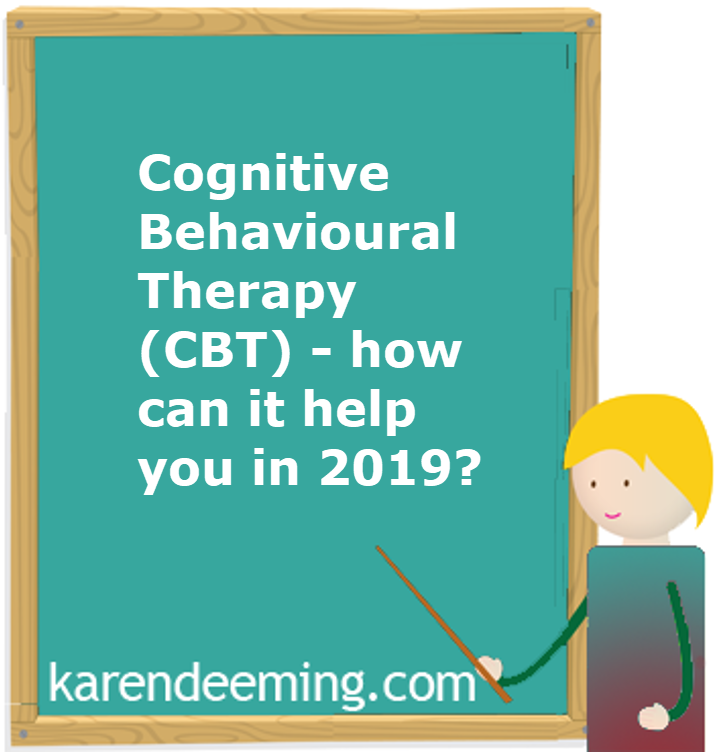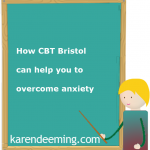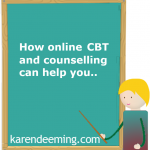

In response to Coronavirus (Covid-19), I am offering telephone, online counselling and CBT sessions via Zoom and WhatsApp.
What is Cognitive Behavioural Therapy (CBT)?
CBT is an evidence-based, collaborative, solution-focussed form of counselling/therapy approved by the NHS.
It is a way of talking about:
- how you think about yourself, the world and other people
- how what you do affects your thoughts and feelings.
CBT can help you to change how you think (‘Cognitive’) and what you do (‘Behaviour’).
These changes can help you to feel better. Unlike some of the other talking treatments, CBT focuses on the ‘here and now’ problems and difficulties. Instead of focusing on the causes of your distress or symptoms in the past, CBT looks for ways to improve your state of mind now.
When does CBT help?
CBT has been shown to help with many different types of problems. These include: anxiety, depression, insomnia, panic, phobias (including agoraphobia and social phobia), stress, bulimia, obsessive compulsive disorder, post-traumatic stress disorder, bipolar disorder and psychosis.
CBT may also help if you have difficulties with anger, a low opinion of yourself or physical health problems, like pain or fatigue.
How does CBT work?
CBT can help you to make sense of overwhelming problems by breaking them down into smaller parts. This makes it easier to see how they are connected and how they affect you.
These parts are:
A Situation – a problem, event or difficult situation.
From this can follow:
Thoughts
Emotions
Physical feelings
Actions
Each of these areas can affect the others. How you think about a problem can affect how you feel physically and emotionally.
There are helpful and unhelpful ways of reacting to most situations, depending on how you think about it. The way you think can be helpful – or unhelpful.
What’s most helpful is to approach issues with a more positive CBT mindset.
An example using CBT techniques:
The Situation
You’ve had a bad day, feel fed up, so go out shopping. As you walk down the road, someone you know walks by and, apparently, ignores you. This starts a cascade of:
Thoughts:
Unhelpful: He/she ignored me – they don’t like me
Helpful: He/she looks a bit wrapped up in themselves – I wonder if there’s something wrong?
Emotional Feelings:
Unhelpful: Feelings Low, sad and rejected
Helpful: Concerned for the other person, positive
Physical:
Unhelpful: Stomach cramps, low energy, feel sick
Helpful: None – feel comfortable
Action:
Unhelpful: Go home and avoid them
Helpful: Get in touch to make sure they’re OK
The same situation has led to two very different results, depending on how you thought about the situation and:
whether you used another helpful CBT technique: “thoughts aren’t facts”.
How you think has affected how you felt and what you did. In the example in the left hand column, you’ve jumped to a conclusion without very much evidence for it – and this matters, because it’s led to:
having a number of uncomfortable feelings behaving in a way that makes you feel worse.
If you go home feeling depressed, you’ll probably brood on what has happened and feel worse. If you get in touch with the other person, there’s a good chance you’ll feel better about yourself.
If you avoid the other person, you won’t be able to correct any misunderstandings about what they think of you – and you will probably feel worse.
This ‘vicious circle’ can make you feel worse. It can even create new situations that make you feel worse. You can start to believe quite unrealistic (and unpleasant) things about yourself. This happens because, when we are distressed, we are more likely to jump to conclusions and to interpret things in extreme and unhelpful ways.
CBT can help you to break this vicious circle of altered thinking, feelings and behaviour.
When you see the parts of the sequence clearly, you can change them – and so change the way you feel. CBT aims to get you to a point where you can ‘do it yourself’, and work out your own ways of tackling these problems.
What does CBT involve?
The sessions:
You can do CBT individually or with a group of people, or even a self-help book or computer programme.
In England and Wales, two computer-based programmes have been approved for use by the NHS. Fear Fighter is for people with phobias or panic attacks; Beating the Blues is for people with mild to moderate depression.
If you have individual CBT therapy:
You will usually meet with a CBT therapist for between 5 and 20, weekly, or fortnightly sessions. Each session will last 50 minutes.
In the first 2-4 sessions, the CBT therapist will check that you can use this sort of treatment and you will check that you feel comfortable with it.
The CBT therapist will also ask you questions about your past life and background.
Although CBT concentrates on the here and now, at times you may need to talk about the past to understand how it is affecting you now.
You decide what you want to deal with in the short, medium and long term. You and the CBT therapist will usually start by agreeing on what to discuss that day.
How effective is CBT?
CBT is one of the most effective treatments for conditions where anxiety or depression is the main problem.
It is the most effective psychological treatment for moderate and severe depression.
CBT is as effective as antidepressants for many types of depression.
If you have decided to consider Cognitive Behavioural Therapy (CBT), and are not quite ready yet to make contact or to arrange your first session:
By clicking on the links below you can find out more about:
My Cognitive Behavioural Therapy (CBT) specialisms include though are not limited to:
- obsessive compulsive disorder
- low self esteem and shyness
- anger, anxiety, pain and stress management
Click here for details about my CBT qualifications, experience and accreditations.
See my Client Testimonials here.
You can book your appointment here or you can contact me on (044) +7950 751352 for outside the UK or 07950 751352 inside the UK. Alternatively by email: karen@karendeeming.com.




![Karen_Deeminga[1]](http://www.karendeeming.com/wp-content/uploads/2015/09/being-practice-self-portrait-e1541437891746.jpg) Welcome to my site. if you have any queries then please
Welcome to my site. if you have any queries then please

